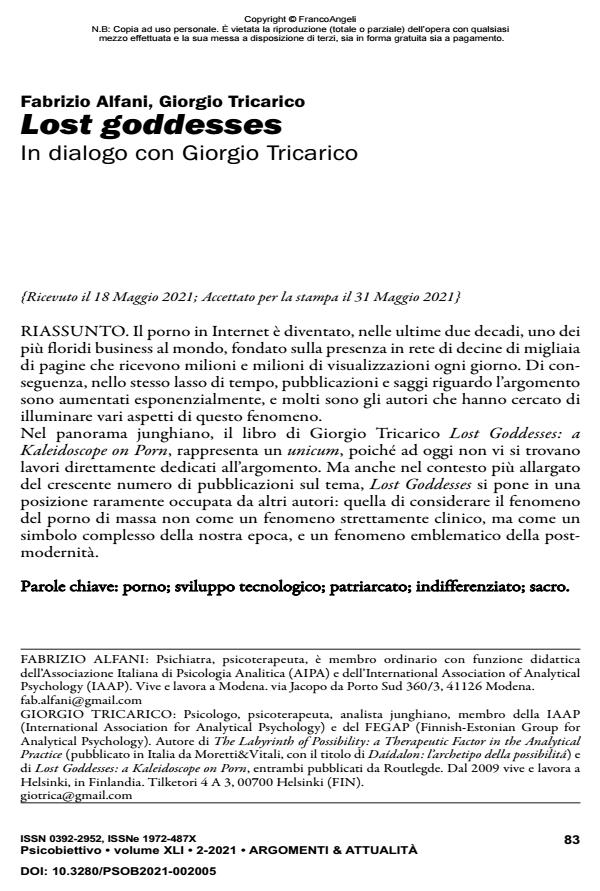Lost goddesses.
Journal title PSICOBIETTIVO
Author/s Fabrizio Alfani, Giorgio Tricarico
Publishing Year 2021 Issue 2021/2
Language Italian Pages 9 P. 83-91 File size 115 KB
DOI 10.3280/PSOB2021-002005
DOI is like a bar code for intellectual property: to have more infomation
click here
Below, you can see the article first page
If you want to buy this article in PDF format, you can do it, following the instructions to buy download credits

FrancoAngeli is member of Publishers International Linking Association, Inc (PILA), a not-for-profit association which run the CrossRef service enabling links to and from online scholarly content.
A dialogue with Giorgio Tricarico SUMMARY. Over the past two decades, Internet porn has become one of the most thriving businesses in the world, where dozens of thousands of webpages are available receiving millions and millions of views every day. At the same time, publications and essays on the subject have increased, and many are the authors who have tried to elighten various aspects of this phenomenon. In the Jungian field, Giorgio Tricarico’s book Lost Goddesses: A Kaleidoscope on Porn, holds a unique place as there are no works to date, explicitly dedicated to the topic. In the wider context of the growing number of publications on the subject, Lost Goddesses places itself in a position rarely occupied by other authors: it considers mass porn not only as a clinical problem, but also as a complex symbol of our time, and an emblematic phenomenon of post-modernity. Key words: porn; technological development; patriarchate; undifferentiated; sacred.
Keywords: porno; sviluppo tecnologico; patriarcato; indifferenziato; sacro.
- Adamo P. (2004) Il porno di massa. Percorsi dell’hard contemporaneo, Raffaello Cortina, Milano
- American Psychiatric Association (2013) Manuale Diagnostico e Statistico dei Disturbi Mentali, Raffaello Cortina, Milano
- Bateson G. (1976) Verso un’ecologia della mente, Adelphi, Milano
- Borghi R. (2020) Decolonialità e privilegio. Pratiche femministe e critica al sistema mondo, Meltemi, Milano
- Brown N. (1971) La vita oltre la morte, Il Saggiatore, Milano
- Chase H.W. et al. (2011) “The neural basis of drug stimulus processing and craving: an activation likelihood estimation meta analysis”, Biological Psychiatry, 70, 8: 785-93
- Coletti M. (2004) “Le nuove dipendenze in una prospettiva sistemica”, Psicobiettivo, XXIV: 29-40
- CovidObsession (2020) Dir. Morgana Mayer, Lucio Massa. Aborsky Produktion
- De Oliveira L., Carvalho J. (2020) “The link between boredom and hypersexuality: A systematic review”, The Journal of Sexual Medicine, 1-11.
- Freud S. (1969) Totem e tabù. Alcune concordanze nella vita psichica ei selvaggi e dei nevrotici, Bollati Boringhieri, Torino
- Freud S. (2007) Al di là del principio del piacere, Mondadori, Milano
- Frisina M. (2020) Sul bordo del caos. Complessità, terapia sistemica e dipendenze, Mimesis, Milano
- Hooks B. (2020) Insegnare a trasgredire. L’educazione come pratica della libertà, Meltemi, Milano
- Kafka M.P. (2010) “Hypersexual Disorder: A proposed Diagnosis for DSM-5”, in Archives of Sexual Behavior, 39: 377-400.
- Kronhausen P.E. (1970) Pornografia e legge, Dellavalle, Torino
- Lambiase E. (2019) La dipendenza sessuale. Diagnosi e strumenti clinici, Carocci Faber, Roma
- Marcuse H. (1968) Eros e civiltà, Einaudi, Torino
- Ogien R. (2005) Pensare la pornografia. Tutti la consumano, nessuno sa cos’è, Isbn, Milano
- Onnis L. (2005) Il tempo sospeso. Anoressia e bulimia tra individuo, famiglia e società, Adelphi, Milano Potenza M.N., Gola M., Voon V., Kor A Kraus S.W. (2017) “Is excessive sexual behaviour an addictive disorder?”, Lancet Psychiatry, 4: 663-664. DOI: 10.1016/S2215-0366(17)30316-
- Preciado P. (2009) Posporno/excitación disidente. Entrevista per Parole de Queer Prunas A. (2020) Il porno crea dipendenza? -- www.antonioprunas.it
- Quattrini F. (2015) Parafilie e devianza. Psicologia e psicopatologia del comportamento sessuale atipico, Giunti, Firenze
- Quattrini F., Spaccarotella M. (2010) “Pornografia: pornofilia, pornofobia e pornodipendenza”, Psicologia Clinica & Psicoterapia Oggi, 3: 12-20
- Spaccarotella M. (2020) Il piacere digitale, Giunti, Firenze
- Valentine Aka Fluida Wolf (2020) Post porno. Corpi liberi di sperimentare per sovvertire gli immaginari sessuali, Eris, Torino
- World Health Organisation (2018) International Classification of Deseases and Related Health Problems (ICD-11), consultabile sui cd.who.int/dev11
- Zattoni F. et al. (2020) “The impact of Covid-19 pandemic on pornography habits: a global analysis of Google Trends”, Int. J. Impot. Res.
Fabrizio Alfani, Giorgio Tricarico, Lost goddesses. In dialogo con Giorgio Tricarico in "PSICOBIETTIVO" 2/2021, pp 83-91, DOI: 10.3280/PSOB2021-002005